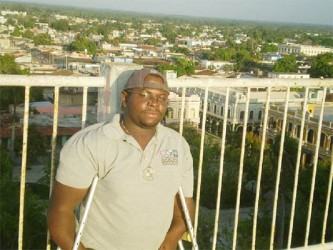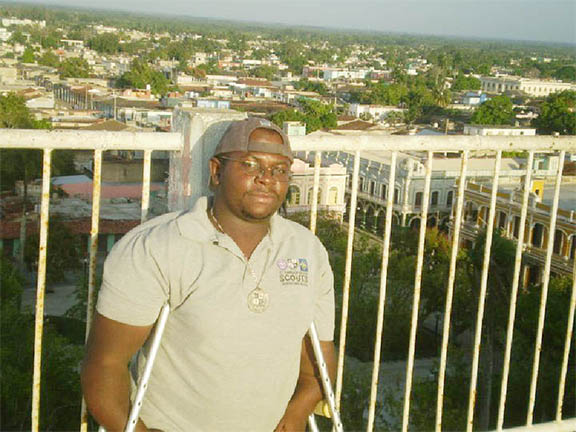By Noelle Smith
Learning to swim was always on Jaime Skeete’s bucket list and it was while doing work study at was then the Guyana Television Broadcast Company (GTV) in 2000 – now the National Communications Network (NCN) – that he became involved with swimming.
“I took the opportunity to say that I’ve always been interested in learning to swim and the coaches who really took me up were Auntie Steph (Stephanie Fraser) and Vibert Charles,” Skeete told Stabroek Sports in an exclusive interview.
It was communication with Fraser that led to him learning to swim at the Dorado Speed Swim Club where his best events were the butterfly and freestyle events.
“Being competitive by nature I guess it was only a matter of time before the competitive thing followed and that’s how I got into training with some of the big swimmers,” Skeete, who has assisted in preparing the country’s Inter Guiana Games swimmers said.
Due to the lack of events catering specifically for persons with disabilities during his competitive career, he would race against the swimmers at the regular Guyana Amateur Swimming Association (GASA.) sanctioned meets.

“When we used to have meets, I would be on the blocks lining up against the other guys and it didn’t look pretty because of the height difference,” he joked.
Things were a bit difficult for him having being born with the physical disability osteogenesis imperfecta.
“You’re born with calcium deficiency which causes your bones to break very easy with people breaking bones by simply sneezing. The immune system is usually weak so persons could die of diseases like pneumonia,” he explained.
This condition has varying degrees. Skeete condition is a lesser one. “It didn’t stop anything ‘cause I was sorta wild,” he recounted of his school life with his disability.
Because he played cricket and was regularly falling out of trees and off bicycles, going to the hospital occurred often.
One issue he had with learning to swim was that the shallow end of the Castellani pool, where the ‘learn-to-swim’ persons would use, was deep, so he would have to bounce on his toes all the time to stay above the water. People looking at someone with Skeete’s condition may put limitations on those individuals and Skeete was aware of this from a young age and more so when he started swimming which is why he pushed himself for distance swimming.
Asked how knowing people looked at him with the ‘you can’t do this or that’ attitude affected him he replied: “I always felt the need to prove to myself and everyone else that I could do what they say I can’t, whether it was joining scouts and going camping and hiking, or getting involved in sports. Competitive swimming was the physical activity I stuck to on a full-time basis.
It was the distance swimming where he would challenge people to because he knew that he could hold his own with his endurance.
Skeete’s love for the sport and wanting to give back is what moved him to assist the coaches of the Dorado Speed Swim Club a little time after he learned how to swim.
“Coaching came along because of the years of teaching swimming with the Saints Scouts and having them compete at the Inter-House and Inter-Schools meets and my swimmers would be the ones to bring away the medals.”
His involvement with the St. Stanislaus College Scout Group included him being a swim coach. His swimmers would represent the school at schools competitions and he was able to move from a ‘learn-to-swim’ instructor to being in charge of competitive swimmers. Upon returning home from studying at the Universidad de Ciego de Avila, in Cuba, where he pursued a degree in Computer Engineering, Skeete’s intention was to expand his knowledge of the sport with the main goal of becoming a certified coach so he attained the FINA levels one and two certificates.
He wrote and was successful at the American Swimming Coaches Association (ASCA) Level Three certificate.
“When I came back from school I planned on getting as much knowledge about the sport to go from being an instructor to a coach. I wanted to go as far as I could and learn as much as possible so that I would be able to coach swimmers.”
Skeete is the first and only swim coach with a disability in Guyana with the certificates to his name. Along with his FINA and ASCA certificates, Skeete, in 2014, attended the FINA Coaches Golden Clinic in Doha, Qatar. Prior to the Clinic in Qatar, Skeete accompanied the Cuban coach, and four swimmers to the Olympic Festival in Mexico.
He was also named one of the coaches for the Goodwill team that represented Guyana against Trinidad and Tobago, Suriname, Barbados and St. Lucia in Barbados and has coached teams at the Amateur Swimming Association of Trinidad and Tobago (A.S.A.T.T) Invitational from his club, a meet used by regional swimmers to qualify for their national teams at upcoming meets such as the Carifta Games, FINA World Championships and the Olympics.
When asked if he ever experienced any discrimination possibly associated with his disability, he recounted one incident which was quickly handled by the head-coach of his club, Stephanie Fraser.
“A parent brought her child to the club to swim and at the level the child was at she would have had to be in my class. When she found out I would be the instructor she told Auntie Steph she does not what her in my class. Auntie Steph told her she either swam with me or not at all. It meant a lot having that kind of support from the head coach of the club.” The way Ms. Fraser stood up for him meant a lot to him to know that he was not seen for his disability by the head of the club rather his capabilities. Skeete pointed out that there are occasional comments here and there about his coaching and his disability but he tries his best to not let them be a bother to him.






